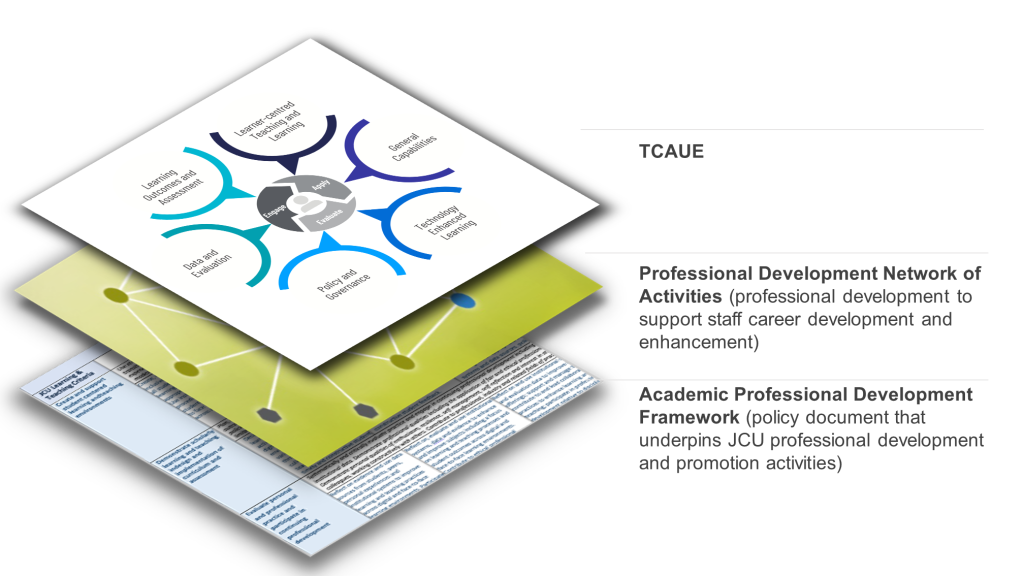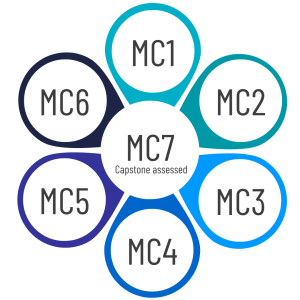TCAUE – Examples and Discussion (as at August 2022)
19 James Cook University Examples
JCU Awards and Citations
At JCU, evidence of successful participation in the TCAUE’s Associate, Foundation, or Advanced credentials is used by educators (and teams of educators) to support internal applications for awards and citations. Internal awards and citations support professional development, employ reflective practice, and are embedded in a learner-centred approach.
JCU offers awards for sessional teaching, inclusive practice, inclusive and accessible learning management, and citations for Sustained Commitment to Enhancing Diversity, Equity and Inclusion, and Outstanding Contributions to Student Learning. Successful recipients of a JCU Citation for Outstanding Contributions to Student Learning can advance to an application for an Australian Awards for University Teaching (AAUT) Citation.
Educators from any discipline are included in the AAUT process. All applications for the national Citation for Outstanding Contributions to Student Learning must produce a diverse range of sustained evidence supporting the contribution made to student learning (Australian Government, 2021a). The TCAUE has an important role in providing reliable and peer-reviewed evidence for the full range of awards and citations.
Academic Performance and Development Framework
JCU has an established a capacity building and career development framework for academics titled the Academic Performance and Development Framework, which has validity in probation, promotion, and professional development. The JCU framework has three domains:
- Create and support student-centred learning and teaching environments.
- Demonstrate scholarly learning and teaching in the design and implementation of curriculum and assessment.
- Evaluate personal and professional practice and participate in continuing professional development.
The TCAUE aligns with the three domains of the Academic Performance and Development Framework, and the volume of learning and learning outcomes in the TCAUE contribute to the evidence-base used when applying for promotion. However, a limitation of the Academic Performance and Development Framework is the containment to academic staff classifications A-E, while the three University Educator Profiles in the TCAUE include the development of professional, sessional, and casual staff (in addition to academic staff).

The Academic Performance and Development Framework comprises a wide range of possible sources of evidence, which are classified by: student learning, student experience, peer review, and self-reflection. Evidence, such as developing a teaching portfolio, self-evaluation, responses to peer/industry/professional feedback, the scholarship of teaching, and teaching and developing learning strategies, are particularly relevant to educator’s participation in the TCAUE’s Associate, Foundation, or Advanced credentials.
Foundations of University Teaching@JCU
Foundations of University Teaching@JCU is part of the University’s suite of professional development programs. It is purposefully designed for newly appointed full-time teaching staff and encourages scholarly inquiry into student learning to advance the practice of teaching. It focuses on: essential information about the JCU learning and teaching context; the higher education regulatory environment and internal policy; student and library support services; assessment moderation and feedback; TEL strategies, including use of the learning management system; and evaluation of learning and teaching. Invitations to all educator roles will be an extension of this program.
Foundations of University Teaching@JCU can be delivered as a series of micro-credentials, as outlined in Table 2.
Table 2. Introduction of the TCAUE
University >
| In place: Academic promotion processes, Ongoing professional development courses, Support for applications for awards, citations and grants, Internal awards and citations. |
Action > Introduce the TCAUE >
| Include all university educator roles, Use the three educator profiles as a guide, The TCAUE adds evidence for awards, citations, grants and promotion, It has portability and recognition, Added to the university’s suite of PD as a formal and personalised approach to PD. |
>TCAUE conceptualised (example)
| Conceptualised as seven micro-credentials MC 1-6 = 15 hours each MC 7 Capstone, assessed = 30 hours Total = 120 hours, equivalent to one subject/unit AQF Level 8, which articulates into a Graduate Certificate of Education. |

|
AAUT recognise the impact that educators have on learning and teaching experiences and outcomes of university students. The awards were established by the Australian Government in 1997.

